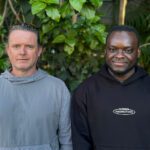Caerwen wasn’t always sure where a human biology and maths degree would lead her. But a chance 2-month long internship at the University of Sydney propelled her into a fulfilling career in neuroscience research.
Caerwen Beaton is completing a PhD with the Curtin Neurotrauma Laboratory, co-supervised by Curtin University’s Dr. Sarah Hellewell and Professor Melinda (Lindy) Fitzgerald. Caerwen and Sarah reflect on the journey to studying neuroscience, conducting a methodological and ethically challenging study and the importance of supportive supervision.
Caerwen:
During my undergraduate degree in human biology and maths at Notre Dame, I applied for a scholarship to do an internship with the University of Sydney. It was on concussion and it aligned with an interesting project I had previously done on biomarkers and concussion. I didn’t think I had a chance, but Sarah called me, and I ended up getting the scholarship to go over to Sydney.
When I moved back to Perth, I wasn’t really sure what I wanted to do. I really enjoyed the research aspect of the internship and we ended up writing a paper based off of the data that we’d acquired. I found it really fulfilling and enjoyed the process. Then COVID happened and I got another call from Sarah. She was moving to Perth and asked me if I wanted to do honours. We met up, had a chat about the projects that were happening at the Fitzgerald lab and it piqued my interest instantly. I did my Honours on a project that ties into my PhD.
My research is examining specific brain activity after concussion and its correlation with concussive symptoms. It’s mainly focussing on the connection between changes in brain activity, acutely and chronically, after initial injury.
There is currently a huge gap in the field between why we recover and what happens to our brain. Being able to determine the symptoms associated with an impacted area of the brain are important in helping to treat the injury and being able to target specific areas of the brain where we see activity changes might also help mitigate symptoms of concussion. As part of our lab, we’re looking at a potential therapeutic intervention, which my study contributes to.
One of the challenges we faced was with our intervention study. Formulating the group was challenging, both ethically and methodologically. It’s brain training, so essentially participants get a stimulus reward – a dot and a beep – based on what their brainwaves are doing, to reinforce positive messages and activity. It was a challenge to formulate the control group for this study. No one’s ever done a study where they’ve built in a placebo aspect. But I spent a lot of time researching and working out how we could do it.
An important achievement so far has come out of a project I’m currently working on using a relatively new research technique called Quantitative EEG. We used EEG data from people who had a concussion within 7 days. Using quantitative EEG, I compared people with concussion to a control group and looked at the differences in brain activity and saw consistently across all of them that there were a lot of dysfunction in specific areas of the brain. I’m going to the Organisation of Human Brain Mapping conference (OHBM) in South Korea in June to present a poster on the data and findings.
I also took part in FameLab last year, which is a national competition for science communication and was one of the national finalists. The opportunity to do FrameLab was amazing. I didn’t think it was as big as it was but I got 6 months’ worth of science communication training. I’m so grateful I did it. I never considered science communication as important and it really highlighted for me how important it is, especially nowadays when people aren’t as trusting of scientists.
It’s so important to have a personal brand and to be able to communicate your research effectively.
One of Sarah’s greatest strengths is pushing us to do hard things but in a way that doesn’t feel scary. Sarah is very good at encouraging you to put yourself out there for things that seem outside of your comfort zone and skillset. When I have a challenging week, I never feel like I’m going to get scolded or feel like my work is not good enough. I feel very comfortable going to Sarah and feel well supported by both of my supervisors.
Sarah:
When I first spoke to Caerwen over the phone, I knew she was very switched on. To be a good student and good learner, you not only need to be book smart but you also need to be social. I could tell Caerwen was both of those things – she was going to be a good allrounder.
We really enjoyed having Caerwen in the lab in Sydney. In those two months at the University of Sydney, she did an enormous systematic review and found that depression was more than four times more common in people who’ve had a concussion compared to people who hadn’t. It was an important study and Caerwen was feet first into the data, analysing and performing very well under the pressure of needing the research done quickly. It was there that I saw she had real potential.
I’ve learnt a lot from Caerwen, especially the flexibility to approach different projects. Caerwen is very good at problem solving and pivoting, so if we’re doing something and it’s not working, she will come to our meeting and propose all the other options she’s researched. I’ve learned a lot about looking at things from other viewpoints and pivoting projects if we need to.
Caerwen and I meet every week and go over where we’re at and discuss if there are any roadblocks. Often Caerwen is dictating those meetings. I try to be open, honest and upfront about things and we also spend a bit of time chatting about personal life. Sometimes supervisors can get very focused on outputs, especially if they don’t meet with their students very often but spending time to check in and being open is so important for students to feel comfortable in approaching you to say they’re having a problem.
A lot of times PhD students, especially if they don’t have a comfortable relationship with their supervisor, will struggle on their own and think, “I should know this”, and try and work it out themselves, rather than asking for help. Making things comfortable and providing support to our students is so important in helping them succeed.
About the researchers:

Caerwen Beaton
Caerwen is a PhD candidate at Curtin University in the Fitzgerald Laboratory. The main aim of her research is to investigate the relationship between concussive symptoms and dysfunctional brain networks using EEG and MRI technology. This research could demonstrate the importance of personalised rehabilitation strategies after injury.

Dr. Sarah Hellewell
Sarah is a Research Fellow in Neurotrauma at Curtin University and the Perron Institute for Neurological and Translational Science. Her research uses MRI, fluid biomarkers and functional tests to understand how injury can alter brain structure and function, and how this translates to cognitive and neuropsychological outcomes.



